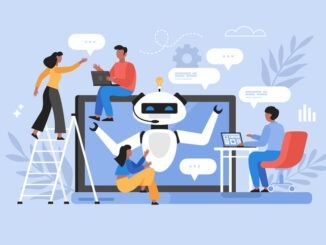
ChatGPT has taken the world by storm, so it’s no wonder people are speculating whether it’ll soon replace salespeople – here, David Jacoby separates the fact from the hype
CREDIT: This is an edited version of an article that originally appeared on Sales Readiness Group
In just a matter of a few months, ChatGPT has created a global frenzy. Its amazing capabilities show how Artificial Intelligence (AI) has evolved from a futuristic concept into real-world applications that are changing how we live and work. Ask it a question, and ChatGPT answers mimicking human conversations. But it also raises important questions about the role of human sales professionals in this rapidly changing landscape.
Will Sales Technology Replace Millions of Jobs?
AI and technological advances have always spurred speculation that human workers would disappear. For example, in the early 2000s, email marketing technology was introduced with the promise of replacing the need for salespeople to prospect. However, the inundation of generic marketing emails showed the importance of human-initiated authentic, and engaging messages that prospects would actually respond to.
Over the past decade, the explosive growth in technology companies has fuelled the expansion of sales jobs. In 2011, Selling Power founder Gerhard Gschwandtner predicted in a Sales 2.0 Conference keynote address that 15 million sales jobs would become obsolete by 2020 thanks to technological advances. That didn’t happen. While many customer service jobs were replaced by self-service technology, many more sales jobs were added.
Commenting on the recent advances in AI, Elon Musk, Bill Gates, and other notable futurists have predicted that AI is a long-term threat to workers. The World Economic Forum recently estimated that AI machines will replace 85 million jobs by 2025.
The Importance of the Human Touch in Sales
Sales is not just a transactional process. It’s a complex, human-centric profession that requires more than technical skills.
The human touch in sales is crucial in building meaningful customer relationships, understanding their unique needs, and providing personalised solutions. Human salespeople possess emotional intelligence, empathy, and the ability to connect with customers on an emotional level, which AI cannot replicate.
Salespeople have the unique ability to build rapport, establish trust, and create long-term relationships with customers. They can read nonverbal cues, understand customer emotions, and adapt their communication style accordingly. They can also navigate complex negotiations, handle objections, and provide creative solutions to meet customer needs.
The Truth about AI Versus Salespeople
While AI seems different from other technological advances, Skynet hasn’t taken over yet — and we probably have a long way to go before it does. That same World Economic Forum Jobs Report estimates that AI will contribute to a work shift that’ll create 97 million new jobs.
AI will continue to evolve and improve, but these improvements will make salespeople more efficient, not replace them entirely. An important consideration is that the most successful salespeople are typically those who build strong customer relationships. And that’s a task uniquely suited to human beings.
Five Traits Every Sales Team Must Have (And Why AI Isn’t Enough)
There’s a high demand for salespeople with unique skills to sell in a complex B2B environment. Here are five important traits for a successful sales team that AI cannot replicate (yet).
Human Interaction
Sales has a high degree of human interaction and connection. While AI can provide personalisation and customised solutions, it cannot replicate the level of human-to-human contact that builds trust and strengthens relationships.
Salespeople can establish rapport, actively listen, and adapt their communication style based on the nuances of each customer interaction. This human touch is crucial in building meaningful relationships that lead to long-term customer loyalty.
Empathy and Emotional Intelligence
Salespeople need high emotional intelligence and the ability to read, understand and respond to human feelings. This level of empathy is difficult to replicate with AI, which does not have emotions.
Salespeople can pick up on subtle cues, understand the customer’s underlying needs and motivations, and tailor their approach accordingly. They can show empathy, understand and address objections, and build customer trust by establishing genuine connections.
Complex Negotiations
Navigating challenging and complex sales deals requires a deep understanding of the customer’s needs, preferences, and budget. Salespeople need to possess nuanced negotiation skills and diplomacy to handle complex sales situations.
They can read between the lines, identify hidden objections, and tailor their negotiation strategies accordingly. This level of negotiation is hard for AI to replicate, especially when customers are not forthcoming with their requirements.
Creative Problem Solving
Salespeople must deeply understand the customer’s problem and develop creative solutions. They need to think critically, analyse situations, and develop innovative solutions to address customer needs.
Salespeople can brainstorm ideas, propose customised solutions, and think outside the box to meet unique customer requirements. This level of creativity and problem-solving is difficult to replicate with AI, which relies on data and algorithms.
Intuition and Judgment
Successful salespeople often rely on their intuition and judgment to make decisions. They can quickly assess situations, anticipate customer needs, and make decisions based on their experience and expertise.
AI, on the other hand, doesn’t have gut feelings or intuition, especially in situations that require more than just data analysis. Salespeople bring a human element of judgment and intuition to sales interactions, which can lead to more effective decision-making and problem-solving.
Salespeople and Technology Working Together
The idea that salespeople are doomed to become obsolete is based on narrow thinking about automation. Just because you can automate a single aspect of a job function doesn’t necessarily mean you can automate the entire job. This happens when people with advanced selling skills have leveraged technology to help them work more efficiently.
When it comes to AI, we’re at the early stages of a long journey. So far, technologies have eliminated basic functions or tasks or made salespeople more productive and valuable. For example, large data sets in CRM systems combined with AI are helping salespeople target prospects who are highly likely to buy and deliver meaningful insights to those buyers.
The Future of the Sales Profession
As technology-based sales enablement tools get better, salespeople have to get better. Ultimately, success will be amplified for salespeople who have the best skills and understand how to use technology to enhance them.
Back in the day, for example, the difference between a top and average performer might have been the number of calls they could make daily. With automation, the winning salesperson is not the one who makes the most calls but who can consistently lead high-valued conversations with customers.
If you’re a sales leader, you’re probably already looking at new sales enablement technology incorporating AI. To maximise your investment, you need salespeople who can inspire trust, solve complicated problems, and build strong customer relationships.
We see renewed fears that machines will replace humans with each new technological leap. While AI can augment and enhance the work of salespeople, it’s unlikely to replace them entirely. The salespeople who develop and improve their skill set to leverage technology to their advantage will rise to the top of the sales profession—now and in the future.


Be the first to comment